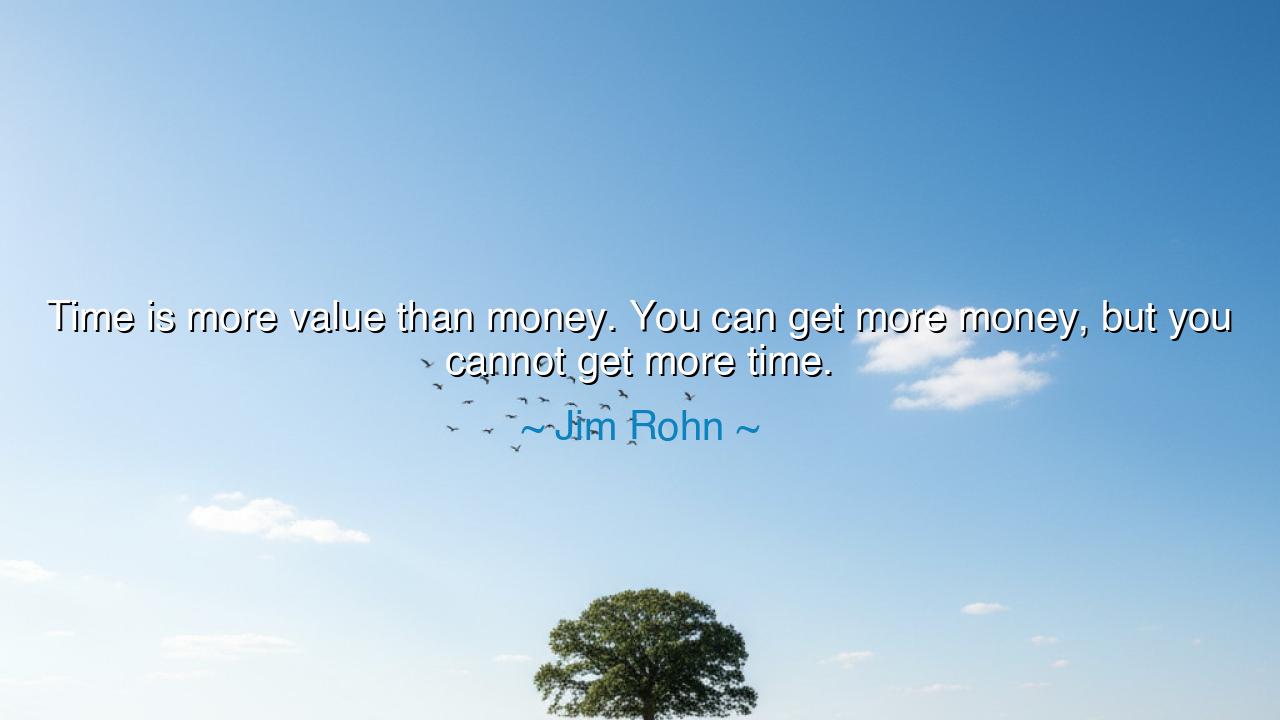
Time is more value than money. You can get more money, but you






The sage of personal growth, Jim Rohn, uttered a truth as sharp as any sword and as enduring as stone: “Time is more value than money. You can get more money, but you cannot get more time.” In these few words lies the weight of eternity, for while men chase after gold and silver, and nations rise and fall upon the clinking of coins, the one treasure that cannot be restored once lost is time. Money is a shadow, a tool that may multiply or diminish. Time is life itself, the breath of our being, flowing forward and never returning.
The ancients themselves understood this law of the universe. Did not Seneca, the Roman Stoic, write that “It is not that we have a short time to live, but that we waste much of it”? He saw with piercing eyes that while wealth may be regained after loss, hours once squandered are buried forever. A merchant may rebuild his fortune after shipwreck, a farmer may replant after his harvest fails, but who can plant again the hour lost in idleness or vanity? Thus Rohn’s words are not modern wisdom only, but an echo of voices that thundered across the centuries.
Consider the story of Steve Jobs, who in his final days, though he possessed vast riches, confessed that no wealth could buy him another hour of life. All the treasures of Apple, all the billions stored in vaults, could not purchase a single breath beyond what fate had measured. His fortune could cure many diseases in others, but it could not erase the mortality written into his flesh. In this he stood as a living parable of Rohn’s teaching: money bends to man’s will, but time bows to no master.
This truth is both humbling and empowering. Humbling, because it reminds us that we walk upon earth as mortals, bound by the rising and setting of the sun. Empowering, because it calls us to live with urgency and purpose, to treat each hour as sacred coin, to spend not on trifles but on what will endure. The man who worships money may find himself rich in his coffers but poor in his soul, while the one who values time will fill his life with meaning, even if his pockets remain light.
Let us, then, look with different eyes upon our days. Time is the true wealth, and how we spend it reveals who we are. Some waste it in bitterness, some sell it cheaply for comfort, while the wise invest it in love, in learning, in labor that outlives them. Just as a seed planted in good soil yields fruit for generations, so the hours given to noble pursuits become a legacy that money cannot buy.
The lesson is clear: guard your hours as you would guard your treasure chest. Count not only the coins in your hand, but the dawns left in your life. Choose wisely where to spend them. If you are tempted to trade your days for riches alone, remember that riches can be rebuilt, but your time cannot be redeemed. Let money be your servant, but let time be your master.
In practice, I say: awaken each morning with a question—“What is worthy of my time today?” Devote yourself to tasks that align with your deepest values. Spend more of your hours with those you love, for no inheritance is greater than shared memories. Invest time in your growth, for knowledge and wisdom multiply even when wealth fades. Above all, live with awareness that your hours are numbered, not to frighten you, but to embolden you to spend them richly.
Thus, children of tomorrow, heed the wisdom of Jim Rohn. Pursue money if you must, but pursue it with the knowledge that it is only dust compared to the flame of time. For when your final hour strikes, it will not be the coins in your hand that comfort you, but the way you spent your fleeting days. Choose well, and your life shall shine brighter than any fortune.






AAdministratorAdministrator
Welcome, honored guests. Please leave a comment, we will respond soon